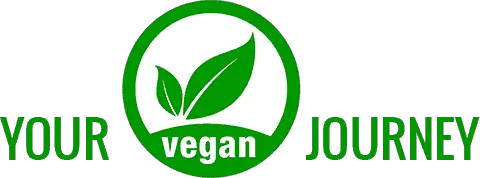Traditionally, bagels were made by adding egg whites to the standard bread formula.1 But, for whatever reason, in recent times manufacturers tend not to use egg white in making bagels. There are a few other ingredients you’ll need to look out for which we’ll cover in this article.
But overall, are bagels considered vegan?
In short, yes they are vegan by mainstream standards—i.e. they would qualify to be advertised as such. Most, but not all, bread products meet the everyday definition of vegan used by the general public, but may or may not qualify as such for the most scrutinizing ethical vegans.
An Important Caveat
For a product to be approved for the Vegan Certification, it can’t contain any of the following:2
- Animal by-products
- Meat, fish, fowl
- Milk or milk products
- Eggs or egg products
- Insects or insect-derived products like silk or dyes
- Honey or honey bee products
- Bone char filtered sugar
- Products sourced from or containing leather, silk, fur, down, feathers, bone, shell, horn, wool, cashmere, angora, shearling, animal skin, mohair, or suede.
- Liquids (wine, beer, maple syrup, fruit juice) clarified or defoamed with animal products.
- Products with animal-tested ingredients
- Products containing animal-derived genes or GMOs
Most of those are pretty straight-forward, and wouldn’t be problematic for bagels. But the first one, animal by-products, is the trickiest and really exists on a spectrum of veganness (if that’s a word).
Above, I said mainstream standards, because vegans vary in the degree to which they abstain from ingredients that are vegan from this source, but not from that source, etc.
Scrutinizing every last ingredient is a headache for most. If you manage to track down the source of the ingredient, the source of the source of the ingredient may not be vegan. You get the idea.
For this reason, PETA wrote in their comprehensive list of animal-derived ingredients, “While we hope this list proves helpful, we also want to emphasize that no one can avoid every single animal ingredient. Being vegan is about helping animals, not maintaining personal purity.”3
They go on to say that boycotting largely vegan products actually does more harm than good to animals in the long run. For example, a restaurant may offer bacon, egg, and cheese biscuits to the general public while advertising bagels on the vegan menu.
If you refuse the bagel because it has trace amounts of diglycerides or some other obscure potentially-animal-derived ingredient you are now disincentivizing the restaurant from offering the vegan item as it’ll be said by the marketing experts to have performed poorly in sales. There goes that product.
For that reason, I’ll list two categories:
- Bagels generally recognized as vegan (GRAV)
- Bagels for the strictest vegans
Bagels Generally Recognized as Vegan (GRAV)

Some bagels are outright non-vegan and wouldn’t even be advertised as such. I’ll list some bagels that are known to be vegan and also cover the most common ingredients used in bagels, their function, and whether or not they disqualify a bagel from being vegan in the traditional sense.
I could just provide a list of specific bagels by brand, but that’s likely to change over time, so what we’ll do is go over a list of bagel ingredients that, if present, would disqualify the bagel from classifying as vegan.
Bagels having the following ingredients do not qualify as vegan in the traditional sense.
These Bagels Are Free of the Following
Meat, Fish, Fowl
- So, no bagel and lox, bagel sandwiches with meat, etc.
Milk or Milk Products
- Bagels with cream cheese
- Bagels with cheese—many bagels come with grated cheese that’s sprinkled on top and then toasted so it’s nice and crispy.
- Butter. Baked goods actually tend to use margarine, because margarine and fully hydrogenated oils have a better shelf life. But, if it’s listed as butter, that would render the bagel non-vegan.
- Milk additives like casein and whey
Eggs or Egg Products
- Bagels with egg listed in the ingredients. Remember, bagels were traditionally made with egg white simply added to the white bread formula, but tend not to be these days.
- Then there’s bagels with egg white glaze—it gives the bagels a nice shine.
- Obviously, bagel sandwiches with egg don’t qualify as vegan.
Honey
- Bagels with honey listed as an ingredient. Honey is actually a pretty common flavor for bagels—it’s often paired with cinnamon and raisins, etc.
What About Micronutrients?
These are usually fine as they’re typically minerals (mined from the earth) or vitamins produced microbially or via chemical synthesis.
Examples of vegan-appropriate micronutrients often found in bagels include:4
- Iron (usually listed as reduced iron)
- Niacin
- Thiamin mononitrate (B1)
- Riboflavin (B2)
- Folic acid (B9)
Again, these are okay. Vitamin D added to food products usually isn’t vegan—it tends to be D3 derived from lanolin (sheep oil).5
But, I’ve yet to come across a bagel with vitamin D, so you should be good here.
You might be wondering about calcium. After all, don’t they use bone meal? Not for the purposes of calcium used as an additive in foods (calcium propionate, etc.). In the US and Canada, calcium is largely produced via the reduction of lime with aluminum at high temperatures.6
Commercial Vegan Bagels (Vegan By Mainstream Standards)
Dunkin Donuts
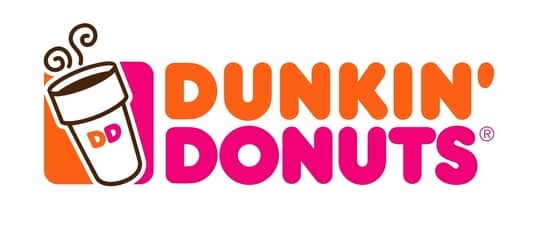
Business Insider put out an article naming the bagels that are vegan-approved.7 I double-checked the ingredients, and the following bagels all check out.8
- Cinnamon Raisin
- Everything Bagel
- Sesame Bagel
- Multigrain bagel
- Plain bagel
They do have enzymes which are considered ambiguous, but again, organizations like PETA and the vegan community at large give their stamp of approval.
Thomas’ Bagels
These can be found at Walmart, Target, etc. and come in a variety of flavors. These varieties are considered vegan by conventional standards as PETA—a very mainstream organization—endorses them in one of their articles.
The flavors mentioned as vegan include:9
- 100% Whole Wheat
- Cinnamon Swirl
- Cinnamon Raisin
- Blueberry
- Onion
- Everything
- Plain
- Plain Made With Whole Grain
Sarah Lee Bagels
These are ultra easy to find and all but the Soft and Smooth varieties are considered by most to be vegan.9
Flavors include:
- Plain
- Blueberry
- Onion
- Everything
Other Select Brands
These include:9
- Trader Joe’s—whole wheat and plain.
- Trader Joe’s mini’s—both multi-grain and original are vegan.
- Rudi’s Organic Bakery Bagels—all flavors.
- Lender’s Bagels—all but the egg variety (they use egg yolk powder)
- Cobblestone Bread Co.—whole wheat.
Bagels for the Extra Prudent Vegan
Here, it would be faster to focus strictly on the ingredients that are allowed, instead of focusing on ingredients to avoid. Additives (amino acids and mono- and diglycerides, xanthan gum, etc.) may or may not be of animal origin, so it’s best to stick to ingredients not far removed from plants if you want to be extra careful.
Remember, aside from the truly plant-based products, it’s nigh impossible to know for sure whether an ingredient has in some way—directly or indirectly—been derived from an animal at some point.
So, here’s a list of common bagel ingredients that are strictly plant-based.
- Grains: barley meal, rye, spelt, millet, quinoa, oats, cornmeal
- Wheat gluten
- Cane sugar
- Canola oil
- Yeast
- Wheat enzymes
- Cultured grains—cultured wheat, fermented rye flour, etc.
- Vinegar
- Salt
- Seeds (chia, flax, sesame, poppy, sunflower, etc.)
- Minced/dehydrated onion and garlic
Go With the Vegan Label
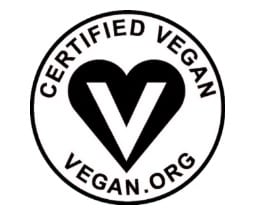
Unfortunately, at present the FDA doesn’t actually require the labeling of vegetarian and vegan foods as such.10
But, while the government doesn’t regulate vegan labels, consumers surely do. If a company used a vegan label on a product that contained animal products, it wouldn’t be long before the company got descended on by a mob of angry customers.
Plus, some labels, like the Certified Vegan Logo are independently verified by third-party organizations. Vegan.org scrutinizes every product bearing their logo to ensure they’re devoid of the long list of ingredients posted above in the intro of this article.
So, next time you’re at the grocery store looking for vegan bagels, look for the icon.
Verified Vegan Bagels (Strict Standards)
Panera
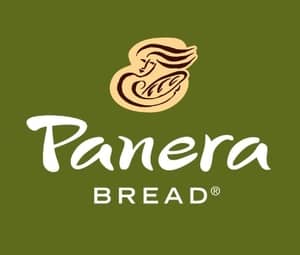
The following are the bagels currently advertised on Panera as being vegan.11
- The Plain Bagel
- Blueberry Bagel
- Cranberry Walnut Bagel
- Sesame Seed Bagel
Mike’s Killer Bread
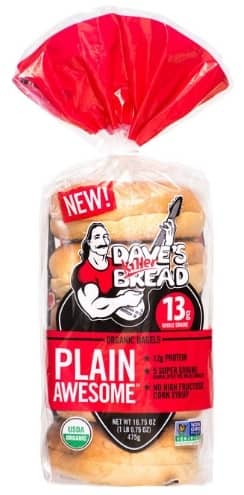
They advertise that their only non-vegan bread product is the Honey & Flax variety (regular bread, not bagels).12
- Cinnamon Raisin Remix
- Organic Epic Everything Bagels
- Organic Plain Awesome Bagels
- Boomin Berry Bagels
So, that wraps it up for bagels. Hope you learned a thing or two and thank you for eating vegan.
References
- Understanding Food: Principles and Preparation (Page 429). Amy Brown – Wadsworth Cengage Learning – 2011
- Certification | https://vegan.org/certification/
- Animal-derived Ingredients Resource | Living https://www.peta.org/living/food/animal-ingredients-list/
- Jose L. Revuelta, Ruben M. Buey, Rodrigo Ledesma‐Amaro, and Erick J. Microbial biotechnology for the synthesis of (pro)vitamins, biopigments and antioxidants: challenges and opportunities. Microb Biotechnol. 2016 Sep; 9(5): 564–567.
- Barnett, G. (1986). “Lanolin and Derivatives”. Cosmetics & Toiletries. 101: 21–44. ISSN 0361-4387.
- Hluchan and Pomerantz, p. 484
- 5 Dunkin’ Donuts Menu Items You Didn’t Know Were Vegan Spoon University – https://www.businessinsider.com/dunkin-donuts-menu-items-you-didnt-know-were-vegan-2017-9
- Bagels | Dunkin’® https://www.dunkindonuts.com/en/food-drinks/bakery-snacks/bagels
- These Vegan Bagel And Cream Cheese Brands Will Make Your Day https://www.peta.org/living/food/vegan-bagels-cream-cheese/
- Carrie Griffin Basas. ‘V’ is for Vegetarian: FDA-Mandated Vegetarian Food Labeling. Utah Law Review, Vol. 4, No. 1275, 2011. https://papers.ssrn.com/sol3/papers.cfm?abstract_id=1434040
- Panera Bread | Eating Vegan https://www.panerabread.com/en-us/articles/eating-vegan.html
- Frequently Asked Questions http://www.daveskillerbread.com/faq
